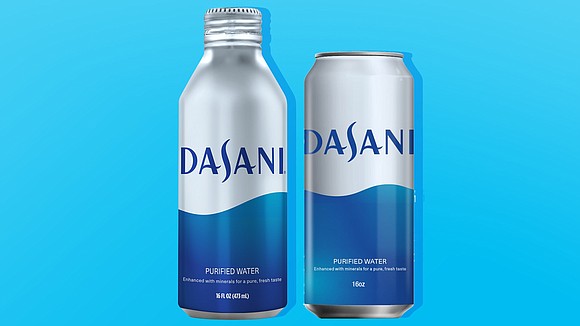Coca-Cola will sell Dasani in aluminum cans and bottles
CNN/Stylemagazine.com Newswire | 8/13/2019, 8:57 a.m.
Updated: 13 AUG 19 09:24 ET
By Danielle Wiener-Bronner, CNN Business
(CNN) -- Coca-Cola is giving Dasani a green makeover to help meet its environmental goals and boost interest in its biggest water brand.
Over the next year, the beverage company plans to unveil new Dasani packaging and products, including aluminum cans and bottles, "How2Recycle" labels and improved Dasani water coolers.
Coca-Cola will continue to sell Dasani in plastic bottles too, but it will reduce the amount of plastic in those containers through a process called lightweighting. Coke is also launching a new hybrid bottle made with up to 50% recycled plastic and renewable, plant-based materials.
As consumers grow concerned about plastic pollution, big companies are pledging to reduce packaging waste. Coca-Cola, which produced 3.3 million tons of plastic in 2017, plans to collect and recycle the equivalent of every bottle or can it sells by 2030. It's also committed to making its bottles and cans out of at least 50% recycled material in the next 11 years.
The changes to Dasani could help Coca-Cola reach those goals and remove about 1 billion virgin plastic bottles, made with non-recycled plastic, from its supply chain over the next five years.
It'll have some competition.
PepsiCo has also announced that it will start selling its Aquafina water brand in aluminum cans at US fast food and restaurant chains as soon as next year. The company is also testing out a broader rollout to retail stores.
Greening Dasani
Using aluminum bottles and cans may help increase the number of of Dasani products that get recycled. Aluminum is recycled more easily than plastic, and the "How2Recycle" labels should help clarify how the package should be recycled.
The company is also launching a new version of the Dasani PureFill water dispensers, which allow people fill their own bottles or cups with Dasani products, including flavored and sparkling waters.
Environmentalists argue the best way to eliminate waste is to reuse containers. But the "solution can't be one thing," said Bruce Karas, vice president of environment and sustainability for Coca-Cola North America.
Coca-Cola's plan is to "create a future where the consumer has a number of choices" that can reduce their impact on the environment, he said. Launching several types of products will help Coca-Cola learn about consumer behavior, he added.
Making Dasani special
Innovations could not only help Coca-Cola reach its goals, but revitalize interest in Dasani.
"We really think about the future of this brand differentiating on sustainability credentials," said Lauren King, brand director for Dasani, who noted that Dasani is growing along with the bottled water trend.
Sales of packaged water have been growing steadily over the past several years, according to a report published by the research brand Mintel in February. The sector will probably continue to grow, Mintel said, because consumers are ditching sugary drinks for healthier options like water and seltzer.
But sales could take a hit if customers decide to fill up their own bottles from the tap instead of buying water in plastic bottles to help protect the environment.
Dasani also faces increased competition from store-brand water brands, which consumers often buy in bulk.
"Mainstream water brands like Dasani were under pressure," Coca-Cola CEO James Quincey said during an analyst call discussing the company's second quarter earnings. "There's some challenge there," he said.
But Coca-Cola's premium water brand, Smartwater, is doing "really well," he said. That may be because it offers certain ingredients people wouldn't find in plain tap water, including added electrolytes or antioxidants.




